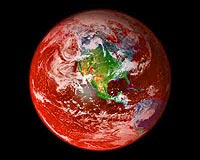| . |  |
. |
Sydney (AFP) Dec 2, 2009 Australia's government on Wednesday said it will introduce defeated climate change legislation to parliament for a third time, passing up the opportunity to call snap elections. "We will come to parliament again, we will seek passage of the bill," Deputy Prime Minister Julia Gillard told reporters. "All options are on the table as to what happens next." The statement follows the upper house's second rejection of a carbon trading scheme, giving the government powers to dissolve parliament and hold early polls. The defeat of the bills, aiming to slash greenhouse emissions by between five and 25 percent of 2000 levels by 2020, came as a blow to Prime Minister Kevin Rudd ahead of UN climate talks in Copenhagen. "The purpose of choosing to do that is to give the Liberal Party, who in this parliamentary fortnight has been such a rabble and in such disarray... time over the Christmas period for calmer heads to prevail," Gillard said. The opposition Liberal Party ousted its leader Malcolm Turnbull on Tuesday for supporting the scheme, replacing him with colourful climate-change sceptic Tony Abbott. Rudd campaigned on a strong environmental platform but now heads to this month's Copenhagen summit, aimed at thrashing out a successor to the Kyoto Protocol, without any agreement to cut emissions.
earlier related report The upper house, or Senate, voted down the scheme 33 to 41 after days of tumultuous debate which saw the opposition Coalition leader deposed by a maverick climate-change sceptic. The legislation's second failure since August gives Rudd powers to dissolve parliament and call early elections, which could be held as late as October. It is deeply embarrassing for the pro-green prime minister, who is set for a lead role at the Copenhagen UN summit but presides over a country that remains the world's worst per capita polluter. Rudd's Carbon Pollution Reduction Scheme (CPRS) aimed at cutting emissions blamed for global warming by between five and 25 percent from 2000 levels by 2020, depending on what action is taken at the UN summit this month. But it ran into strong objections from the industrial and agriculture lobby as well as the conservative opposition, which ousted its leader Malcolm Turnbull on Tuesday for supporting the cuts. "What we are debating is whether the science of climate change is real or not. That debate is over," said Greens senator Christine Milne. "The debate we should have been having in this Senate is a recognition that climate change is real and urgent, and what is the most appropriate policy response." Australia now heads to the December 7-17 summit, aimed at thrashing out a successor to the Kyoto Protocol, without an agreement to cut emissions despite pledges from the United States and China, the two biggest polluters. Commonwealth leaders, representing a third of the world's population, also said a legally binding climate agreement was "essential," adding to hopes that the 190-nation talks will be a success. "There's no danger of this country rushing ahead, but as a result of the actions of those opposite there's a risk we will be left behind," climate change minister Penny Wong warned. The European Union has vowed to reduce its emissions by 20 percent from 1990 levels before 2020, rising to 30 percent in the event of an international agreement. Japan has offered 25 percent, but attached conditions. Rudd will now mull whether to fight an early election on the subject of climate change, or allow the legislation -- a key campaign promise -- to founder. He has repeatedly denied any intention to hold snap polls, but has also stressed Australia's "national obligation to act" on climate change. The prime minister would currently be seen as the strong favourite in an election against Tony Abbott, the charismatic but gaffe-prone right-winger who became surprise opposition leader on Tuesday.
Share This Article With Planet Earth
Related Links Climate Science News - Modeling, Mitigation Adaptation
 A four degree world? You really don't want to go there...
A four degree world? You really don't want to go there...Paris (AFP) Dec 2, 2009 If Earth heats by four degrees Celsius -- some seven degrees Fahrenheit -- the planet we call home would become a very unwelcoming place. Even as some world leaders tamp down expectations for the December 7-18 UN climate conference, experts say the threat of a 4C (7.2 F) warming over pre-industrial times is all too plausible. Once that threshold is crossed, what might a four-degree world ... read more |
|
| The content herein, unless otherwise known to be public domain, are Copyright 1995-2009 - SpaceDaily. AFP and UPI Wire Stories are copyright Agence France-Presse and United Press International. ESA Portal Reports are copyright European Space Agency. All NASA sourced material is public domain. Additional copyrights may apply in whole or part to other bona fide parties. Advertising does not imply endorsement,agreement or approval of any opinions, statements or information provided by SpaceDaily on any Web page published or hosted by SpaceDaily. Privacy Statement |